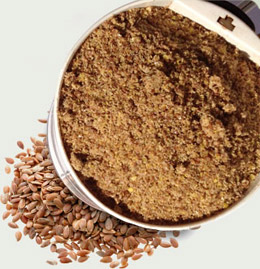
Big health benefits from the tiny flax seed
Posted in General Health & Wellness on November 15, 2012. Last modified on March 28, 2019. Read disclaimer.
Sprinkling just a teaspoon or two (or three) of whole or ground flax seeds on top of your breakfast cereal or oatmeal, into a yogurt, juice or smoothie, or even adding them to breads, pancakes or muffins is a safe* and effective way for many of us to maintain regular bowel movements. This is because flax seed is high in dietary fiber which adds bulk to the stool and enables wastes to move easily through the intestinal tract. (Just be sure you also drink plenty of water during the day or you can make constipation even worse.)
+ Free Shipping & Returns on Eligible Items.
(*Amazon's Top 100 list updated hourly.)
The soluble fiber in flax seed may help lower cholesterol levels and, perhaps, reduce our risk of developing atherosclerosis (hardening of the arteries). Dietary fiber also helps to satiate hunger, so we feel fuller faster -- which is important for anyone trying to lose or control weight.
Another often-cited benefit of ground flax seed (grinding makes the nutrients more available to our body) is that it is rich in alpha-linolenic acid (ALA), a type of omega-3 fatty acid that's related to the omega-3 oils found in fatty fish (DHA and EPA). Omega-3 fatty acid plays an important role in a number of body functions like controlling blood clotting and supporting healthy production of brain cell membranes. (An interesting note: When it comes to ALA, the source is key. ALA consumed in dairy and meat products have been associated with an increased risk in men of developing prostate cancer. No connection, however, has been found between elevated prostate cancer risk and ALA fats found in flax seed and other plant sources. In fact, consuming flax seed may help to reduce the risk or slow the growth of prostate cancer and research on this is underway.)
One of the most exciting components of flax seed is the antioxidant and phytoestrogen compound called lignans -- which may offer anticancer properties. Though not present in flax seed oil, ground flax seed contains 75 to 800 times more lignans than any other food source! Recognized by our bodies as being similar to the female hormone estrogen, lignans may also help to reduce testosterone -- and early research suggests that consuming lignans over a lifetime may have the potential to prevent, slow the progression of, or treat some types of cancers including certain forms of breast cancer, prostate cancer and colon cancer. According to Natural Medicines Comprehensive Database, however, the evidence to support this is still insufficient. A stronger claim exists that flax seed may be effective for relieving hot flashes, night sweats and other mild menopausal symptoms. (Unfortunately, the body's levels of circulating lignans can also be negatively affected by a person's intestinal health and lifestyle choices such as diet, smoking, use of antibiotics and obesity.)
How to store flax seed
Because of it high oil content, ground flax seed can go rancid within a week when left at room temperature. To be safe, use a coffee grinder or food processor to grind the seeds as needed or only as much as you will use within a week or two and store this in an airtight container, away from light in the refrigerator or freezer. Whole flax seeds can be safely stored in the freezer for one year.
* Possible safety concerns of eating flax seeds
While flax seed is generally considered to be a very safe food for most of us, women who are pregnant, are breastfeeding, or suffer from hormone-sensitive conditions may want to avoid eating flax seed since the lignans in flax seed are similar to the female hormone estrogen. Diabetics should monitor blood sugar levels closely since flax seed may lower blood sugar levels. Also, since flax seed may slow blood clotting, people with bleeding disorders should exercise caution. And, people with gastrointestinal conditions may be at increased risk, just as they would be from eating other high fiber foods. Though rare, a severe allergic reaction can occur so it is advisable to start with less than a tablespoon.
Sources (accessed November 15, 2012):
http://www.ncbi.nlm.nih.gov/pmc/articles/PMC2703189/
http://nccam.nih.gov/health/flaxseed/ataglance.html
http://www.umm.edu/altmed/articles/omega-3-000316.htm
http://en.wikipedia.org/wiki/Lignan
http://en.wikipedia.org/wiki/Mucilage
http://www.ncbi.nlm.nih.gov/pubmed/22888664
